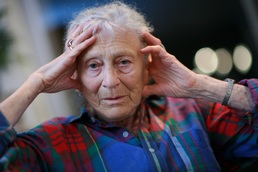Drivers with dementia urged to inform DVLA or risk £1,000 fine

People who have been diagnosed with dementia must inform the Driver and Vehicle Licensing Agency (DVLA) of their condition or risk a £1,000 fine.
Drivers could also face prosecution if they are involved in an accident as a result of the illness. The warning has come today from Stratford upon Avon-based Lodders Solicitors, who has highlighted the real dangers of someone continuing to drive when they have been diagnosed with dementia.
The firm wants more family members to have discussions with their older relatives about driving once they have been diagnosed, and say it is everyone’s responsibility to monitor the person’s changing driving skills and capabilities over time.
The DVLA can ask a person to carry out a driving assessment to accompany medical notes to decide if someone is safe to continue driving. If allowed to carry on driving, a licence will be issued and remain valid for a limited period of time, after which more assessments will be carried out.
Referring to two recent cases where people with dementia have caused fatal crashes , Sofia Tayton, a partner with Lodders Solicitors, who heads the firm’s care and capacity team, explains: “Last month, an 85-year-old man was jailed and ordered to pay £20,000 after being found guilty of killing a young mother with his car in West Hampstead. The retired stockbroker lost control of his 1982 Mercedes and mounted the pavement in November 2012. He was travelling at 54mph after mistaking the accelerator for the brake.
“In another recent case, an 85-year-old woman caused a fatal head-on crash in Kings Lynn when she drifted onto the wrong side of the road, hitting a car driven by an 80-year-old man, who later died from his injuries.
As soon as someone has a formal diagnosis they must inform the DVLA otherwise a fine of £1,000 can be issued. A GP might have already advised a person to stop driving, however the DVLA can make a formal judgement after seeing medical information on how safe it is to continue allowing the person to drive.
Reflecting on the £20,000 fine given to the man who killed a young mother in West Hempstead, the judge said: “The sentence I am about to pass is not in order to make an example of you, but it must be understood that old age cannot be seen as any excuse or mitigation for dangerous or even careless driving. An elderly driver who knows or should acknowledge that he or she is losing his or her faculties is no less a danger than a drunken driver who knows the same.”
Describing the affect dementia can have on drivers, Ms Tayton said: “They get lost even on roads they know well; begin to misjudge speed or distance; find themselves straying across lanes or hitting kerbs; feel at greater risk of having an accident; or cause passengers to have concerns.
“Giving up driving – which is equivalent to giving up independence – is not easy. However, the impact of dementia on memory, reactions, perception and the ability to perform a number of tasks at the same time means that the ability to drive will be lost at some point.”
Latest News Analysis
 04-Sep-19
Extra £1.5 billion announced for social care in Chancellor's Spending Review
04-Sep-19
Extra £1.5 billion announced for social care in Chancellor's Spending Review
 02-Jul-19
Department of Health forced to rethink care homes' nursing rates after legal challenge
02-Jul-19
Department of Health forced to rethink care homes' nursing rates after legal challenge
 18-Jun-19
Overnight care workers forced to sleep in offices and told 'bring your own bedding'
18-Jun-19
Overnight care workers forced to sleep in offices and told 'bring your own bedding'
 14-Jun-19
Back in the closet: Third of care home staff have had no LGBT+ awareness training
14-Jun-19
Back in the closet: Third of care home staff have had no LGBT+ awareness training
 11-Jun-19
PM candidates on social care: Rory Stewart calls fixing care an 'unfinished revolution'
11-Jun-19
PM candidates on social care: Rory Stewart calls fixing care an 'unfinished revolution'